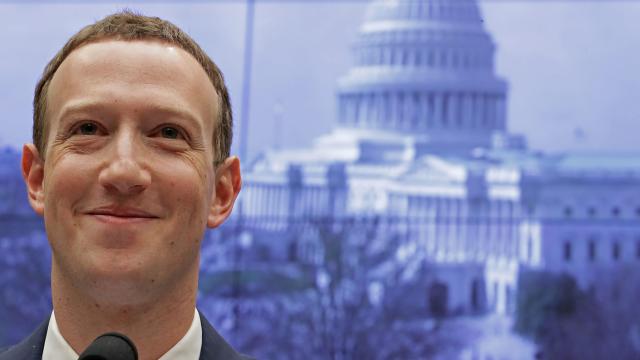After weeks of watching hypnotoad Mark Zuckerberg attempting to smush logic to accommodate a threatening conspiracy theorist, meanwhile allegedly firing critics, Facebook has produced an offering that could maybe take some of the heat off without fixing any of the aforementioned problems. In a rare USA Today op-ed yesterday, Mark Zuckerberg announced that Facebook will allow users to opt-out of political ads. “[F]or those of you who’ve already made up your minds and just want the election to be over, we hear you,” he wrote, “so we’re also introducing the ability to turn off seeing political ads.”
The rollout follows Zuckerberg and wife Priscilla Chan’s response last week to a group of scientists who’ve received funding from their philanthropic organisation, the Chan Zuckerberg Initiative. After the scientists protested Zuckerberg’s inaction against Trump’s post that proclaimed “when the looting starts, the shooting starts,” the couple stated that they were “disgusted” by Trump’s comments. But as for action items go, they could only feebly link to Zuckerberg’s unspecific plan to review policies around the use of state force and voter suppression. The document makes few concrete promises to act, only to think about action: “we’re going to review potential options,” “we’re going to work on…,” “we’re continuing the discussion”…etc.
The new tool opt-out tool is wholely Zuckerbergian, which is to say it avoids risking the ire of politicians in a letter to Amnesty International, in response to privacy concerns: “no one is obliged to sign up for Facebook.” Of course, Trump gets to keep posting away on his personal account.
As a Facebook newsroom post indicates, Facebook will not prominently notify users of this option, but they can find it through a couple of inconspicuous methods. Either click through a vaguely-named ad overlay “confirmed organisation” and select “see fewer ads about this topic” or navigate through settings and ad preferences. This’ll do jack shit for most people who don’t read about Facebook feature updates, but now you know how to purge your timeline of propaganda profits for Zuck.
Facebook says the option is available today for some users, and they’ll implement it across the platform within the next few weeks.
Will this stem the spread of unchecked lies in campaign ads? Seems unlikely. For one, most people probably aren’t reading a Zuckerberg op-ed during a pandemic and a civil rights movement. And then, as Zuckerberg himself has testified, most people don’t read terms of service; it follows that a button on an unwanted ad reading “confirmed organisation” probably isn’t going to generate much interest. On top of that, those who want Trump campaign news probably already follow the source.
Facebook will, however, add a long-overdue disclaimer to help distinguish ads from fake news. It’s now keeping the “paid for by” disclosure on ads, which previously disappeared after they were reposted, causing, in Facebook’s words, “confusion about whether the share was an ad or not.”
In keeping with Zuckerberg’s promise to “advance racial justice and voter engagement” (tied to the Trump post), Facebook has announced that this summer, it will prominently display a “voting centre” with local registration information on both Facebook and Instagram feeds. (They did something similar in 2016 but hope to double the number of users they helped sign up to 4 million this year.) In an ideal world, this would tamp down on creepy political geofencing, a tactic used by groups across the political spectrum to track ideologically associated locations ” like church and protests ” and serve ads aimed at registering voters.
“The next time you go to church, you might want to turn off your phone,” the National Catholic Reporter warned in January, of GOP geofencing. Another ad recently aimed at Black Lives Matter protesters made clear that their locations were being tracked, reading: “Let’s keep the same energy in November.”
For some campaigns, there’s always phase two: get the ad banned, tell Fox News about it, and they’ll show the thing for free.
